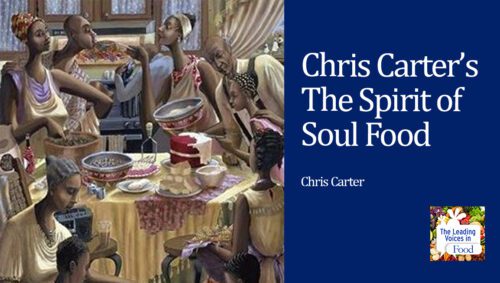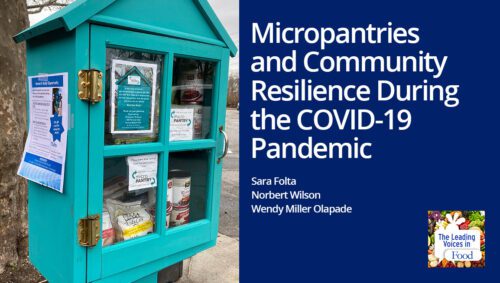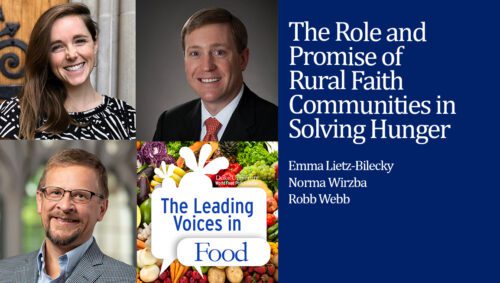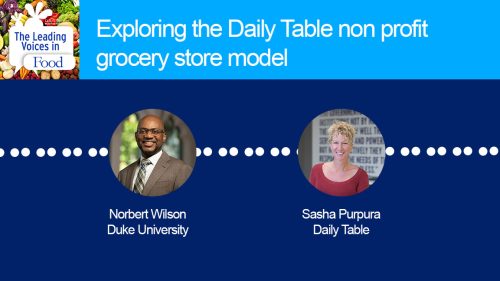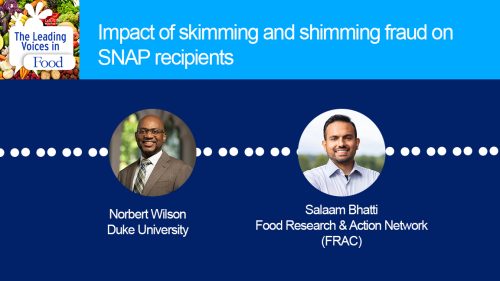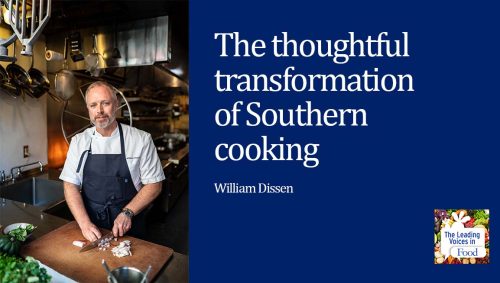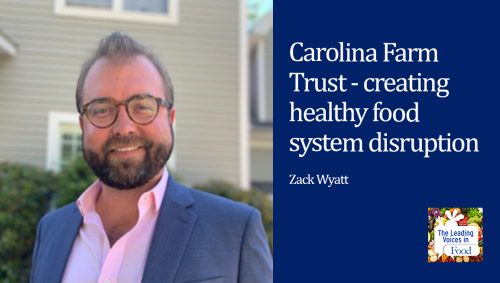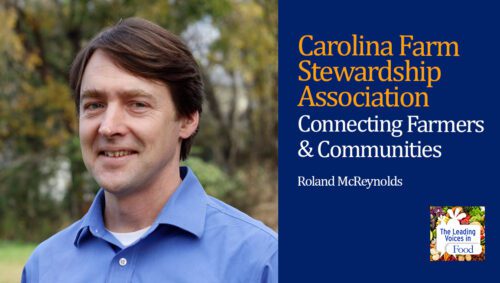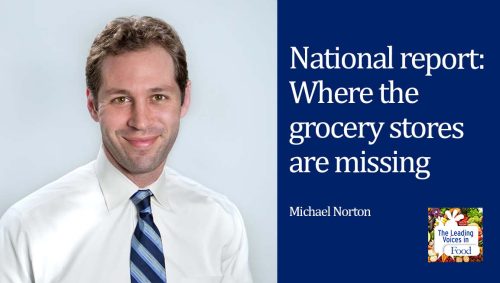The Leading Voices in Food
E124: Food Insecurity Issues are Community Issues
So what comes to mind when you think of these words: life around the table? Do you think of good food or family or sharing maybe? But what about spirituality and faith? So we’re continuing our exploration of food and faith issues in today’s podcast. And I’m speaking with Reverend Dr. Michelle Lewis, the executive director of an organization called, Life Around the Table, an ecumenical non-profit organization focused on food and on environmental justice.
Subscribe: Apple Podcasts | TuneIN | YouTube Music | SoundCloud | PocketCasts | Radio Public
Tags: Advocacy & Food | Community & Economic Development | Faith & Food | Food Insecurity | Food Policy | North Carolina | Philanthropy & Food Systems |

Michelle Lewis is the Executive Director of Life Around the Table, an ecumenical non-profit with a mission of “equipping Christian communities to participate in the flourishing of all creation by cultivating practices faithful eating and Sabbath delight.” She is also the founder of the Peace Garden Project, a non-profit with gardens in New York and North Carolina with the goal of addressing food and environmental justice while looking at the intersections of food justice with other justice issues. Her doctorate in ministry from Candler School of theology focused on food justice and spirituality. Prior to relocating to North Carolina, Michelle pastored a multi-racial/multi-ethnic church in New Rochelle, N.Y. and has pastored churches on the Outer Banks of NC, in Catskill, New York and East Berlin, Connecticut. She in an Elder in full connection in the United Methodist Church. Michelle also served as a multi-faith Chaplain at Hartford Hospital. As a public theologian, Michelle has produced a podcast and radio show called “Unpacking Faith” that examines how people of differing faiths view national and world events, and the role that faith has in how individuals and communities interact in natural and built environments. Michelle is an Elder in full connection in the New York Annual Conference of the United Methodist Church but is current living and working on the Outer Banks of North Carolina in her hometown, Manteo.
Interview
Let me begin by asking you, if you wouldn’t mind, to describe Life Around the Table, what does you organization do? And let us know how it works to create a diverse and inclusive community.
Life Around the Table is an ecumenical organization, a really good way to understand what we do is we help faith communities think about what it means to be in right relationship with God is our creator and creation and our neighbors. We ask these questions, what does it look like to do this around table? So what does it look like to do this in community and small groups to begin having these conversations? And we do that through our Eating Together Faithfully framework and also through a ministry called Sabbath Life where we work with clergy to live into Sabbath in creation. So we do this on farms, we invite clergy out and they spend a day with us once a month, usually over a 10 month period of time to worship, to work as a part of their Sabbath and creation in these gardens and on these farms and to experience silence. But when we’re in creation, experiencing creation is a part of it. We find that what starts in silence actually ends up being a really beautiful music that’s formed by creation.
It sounds so inspiring and interesting, and when you mentioned the Eating Together Faithfully program that you run, it sounds like this is a pretty new thing in divinity circles, but maybe I’m not right with that. And is that true and do you see interest growing?
I definitely see interest growing and Life Around the Table has had a presence in the central North Carolina area for about seven years. But you are correct, these questions of religion and environment and how they merge, it’s a relatively new and emerging field. And I say relatively new because it’s been around but it hasn’t really been something people talk about. When we look at the Genesis story of creation, God created the world and then here come Adam and Eve, and God gives Adam and Eve charge over the gardens. We often talk about creation in a sense of something we have dominion over, but what does it look like to be in community with creation? And these conversations have been happening in a number of ways for centuries but we’re really trying to take a approach to food and faith and environment and inviting folks to come around these tables together and think about who’s not at the table? Who are those people missing from around the table? And how then are we creating tables and communities that really are welcoming everyone? One of the ways that in Life Around the Table, we talk about foods or the Food that LAUGHS framework – it’s food that’s Local and Affordable, it’s Uncomplicated, it’s Good, it’s Healthy and it’s Seasonal. And so when food is all of these things for everyone, we end up with healthier communities anyway. But so often it’s not all those things for everyone, you know, it may be affordable but not simple. Often one of the reasons you see that people eat fast food as well, it was fast, it was affordable, but it’s definitely not simple. When you look at the list of things that are in that hamburger or that cheeseburger or whatever it is that you’ve chosen, but sometimes chosen because you didn’t have other options.
If this is catching on as you say, then I’d expect that divinity schools or theological training, the institutions are beginning to show signs of including these sorts of things in their curriculum, is that true?
That is true. Duke has a certificate program now, I believe and Yale Divinity School actually has a joint degree program that you can do with the School of the Environment, where you can think about it and research these things and try to live into this work in a different way. And other seminaries are beginning to ask these questions too and are beginning to shape these programs as well.
So I understand that your ministry doctorate from the Candler School of Theology focused on food, justice and spirituality, and I’m particularly interested in your perspective on what roles, race plays in food access. And also I’d love to get your thoughts on how faith systems address the crisis of food access in the community.
Research shows us that African-American communities are two times more likely to experience hunger than white households. There is an issue with access. I like to talk about what I call food mirages. It’s often in communities that you’ll say well there are plenty of stores here, there are plenty of grocery stores, there are lots of farmer’s markets, and I say that often in those communities what you have are food mirages. So there is the appearance that food is there, but everyone actually isn’t able to get to it because cost is often a barrier. If you’ve bought anything organic, then you know the price of organic goes up exponentially. Do people have access? And then do they have access to quality food?
And so when I think about the role that faith communities can play, we can find a church in almost every community that has a food pantry. And some churches do food pantries really well, in some churches they’re just kind of figuring that out. And sometimes it’s not a food pantry, but it’s a hot meal, and one of the things that those groups can ask is are we providing the highest quality food? Because often it’s not about highest quality it’s about quantity. Are we sacrificing quality for quantity? Is that something that we have to do or are there partnerships that we can form within the community so that we’re addressing the quantity needs while addressing quality as well? An example is that a lot of food pantries will get fresh produce from supermarkets, say fresh and kind of put that in quotes, because when the produce comes in, it’s not exactly fresh and it’s the stuff that the grocery store couldn’t sell so they decided to give it to charity. And recently had so much share with me, they said, “Yeah, well you know, we do get produce from such and such food pantry, but when we get it if we don’t eat it all in 24 hours, we have to throw it in the trash.” So it’s produced that’s at the end of its life, that if you and I were going into a grocery store, we wouldn’t buy it. And we’d probably complain to the manager because they were trying to sell this end of life, dead produce, not quite fit to eat to us. But we’re often more than happy to give that stuff to poor folks. They’ll take it, they need food and we can just give them anything, right? And I think that so often at that’s been the approach, and I like to think of food ministries as being, we’re sitting down to the table and Jesus is at the table with us. Which our goal should be to see Jesus in everyone, right? Would we feed this to Jesus? Maybe we would, but perhaps we’d look for something else. So that would be the thing that I would encourage churches and faith communities that are really engaged in food ministry to think about. Are we doing the best that we can do recognizing that there are so many people who fall between the cracks, people who need assistance, but don’t qualify.
Such an interesting perspective and it’s interesting how you and others are looking at the barriers to access to fresh and healthy foods, and kind of taking them on one by one. Let me ask you a question about the COVID pandemic, how have you seen community food needs change?
So just in my own community, I’ve seen the number of families in need go through the roof. And if you enrolled food program, their numbers for 2019 we’re at about 135 million people were food insecure that year across the world and it’s estimated that that number went up to more than 265 million people in 2020. I know people who’ve shared with me that they’ve gone to food distributions and food pantries for the first time in their life because of the pandemic. The pandemic has increased the need for food, so many communities already unable to meet the need that was present and then pandemic happened. And often help with food distribution in my own community, we encountered people from other counties who said the pantry in my community just ran out of food, there was not any food in our community lab. They had to drive an hour and a half or an hour and 15 minutes to get to where we were helping with food distribution to get food. The pandemic is in a lot of ways leveled the playing field, food insecurity happens to all households and perhaps the number of African-American households that were food insecure were twice that of white households, but right now, everybody’s food insecure. Food insecurity is not race dependent, so there are black people and white people and Asian people and Latino people that are food insecure. And so food insecure has touched virtually every community now and my hope is that with that, the people who previously have seen it as other people’s problem will begin to see it as community problem, and we’ll want to do the work of addressing food insecurity in their communities.
Now I’d like to shift gears for just a moment and talk about the connection between food justice and environmental justice. And I know you’ve given a great deal of thought to this, how are those two things connected in your mind? And how is Life Around the Table dealing with things like changing climate?
When I think about food justice being connected to environmental justice, it really is about this health piece, because when a community is food insecure, when families are food insecure, lends itself to communities being unhealthy. When people don’t have access to quality food, it produces all sorts of negative health outcomes, and so when we think about environmental justice, environmental justice is really about creating healthy communities. Getting the environment to the point where everyone is experiencing good health. And so that’s how I see the connection between food justice and environmental justice. Even when we look at how food is grown and processed, the type of resources and energy that it takes to create processed food versus that energy that it takes to just create natural good food. At Life Around the table, we would call that Food that LAUGHS, food that’s local and affordable and simple. So are we creating healthy food that is good for us and good for our communities? Those really are issues of environmental justice.
Let me ask a little bit more about the people who take part in the Eating Together Faithfully program. So the members of the clergy will come and spend time with you, and you mentioned a little bit before about what that was about, how do you feel they’re changed as a consequence of that experience, and what sort of things do they do when they get back to their work?
We hope that it causes them to interact with people that they perhaps wouldn’t ordinarily interact with. They also have these environmental interactions that they are probably not having on a daily basis. On one of the farms where we meet, there’s a goat, that’s a very active goat. And we have a couple of participants right now who are like, “Oh my gosh – goats!” And Kelly, I got to see a donkey for the first time in my life last week. I don’t think I’ve ever seen a real live donkey that was close enough that if I want to touch it, I probably could. But when we see and experience these parts of creation that we have only heard about or read about, or when we experienced being with people that we’re ordinarily not with, it changes us. I think it changes our spirits, it changes our hearts, it definitely changes our minds when we’re operating out of a place of experience versus out of a place of just, well, this is what I heard, or this isn’t something I knew because I’ve lived it. My experience is that people walk away from it seeing the world differently. And I talked with one former participant in Sabbath Life last week, I said, “Did it change how you practice Sabbath?” And they said, “You know, it really did. It changed how I practice Sabbath, but also how I interact with my family and my community as well.”






